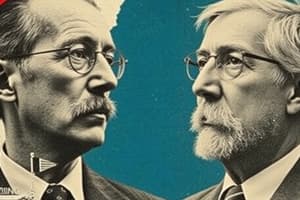Podcast
Questions and Answers
What is John Rawls known for?
What is John Rawls known for?
- Economics
- Molecular Biology
- Political Philosophy (correct)
- Art History
What is Rawls's theory of justice?
What is Rawls's theory of justice?
- Justice as Equality
- Justice as Freedom
- Justice as Fairness (correct)
- Justice as Power
What is the 'original position'?
What is the 'original position'?
- A thought experiment (correct)
- A social contract
- A legal term
- A philosophical argument
What are the two principles of justice derived from the original position?
What are the two principles of justice derived from the original position?
What is the 'Veil of Ignorance'?
What is the 'Veil of Ignorance'?
What is Rawls' work on 'non-ideal theory'?
What is Rawls' work on 'non-ideal theory'?
What is the 'ideal of public reason'?
What is the 'ideal of public reason'?
What is 'The Law of Peoples'?
What is 'The Law of Peoples'?
What is Rawls's impact on contemporary politics?
What is Rawls's impact on contemporary politics?
Flashcards
What is John Rawls's theory of justice?
What is John Rawls's theory of justice?
John Rawls, a renowned American philosopher, developed a theory of justice based on the principles of fairness and equality, aiming to create a society that upholds both individual liberties and the well-being of the least advantaged.
What is the Liberty Principle in Rawls's theory?
What is the Liberty Principle in Rawls's theory?
In Rawls's theory, a just society prioritizes basic liberties for all citizens, ensuring freedom of speech, religion, and assembly.
What is the second principle in Rawls's theory of justice?
What is the second principle in Rawls's theory of justice?
The second principle of Rawls's theory aims to ensure fairness in the distribution of resources and opportunities, specifically benefiting those who are least advantaged.
What is the 'original position' in Rawls's theory?
What is the 'original position' in Rawls's theory?
Signup and view all the flashcards
What does Rawls refer to as 'basic structure'?
What does Rawls refer to as 'basic structure'?
Signup and view all the flashcards
How does Rawls prioritize the principles of justice?
How does Rawls prioritize the principles of justice?
Signup and view all the flashcards
What is 'partial compliance' in Rawls's theory?
What is 'partial compliance' in Rawls's theory?
Signup and view all the flashcards
What does Rawls's 'Political Liberalism' focus on?
What does Rawls's 'Political Liberalism' focus on?
Signup and view all the flashcards
What is Rawls's 'The Law of Peoples' about?
What is Rawls's 'The Law of Peoples' about?
Signup and view all the flashcards
Study Notes
John Rawls: American Political Philosopher (1921-2002)
-
John Rawls was an American moral, legal, and political philosopher in the liberal tradition.
-
Rawls received both the Schock Prize for Logic and Philosophy and the National Humanities Medal in 1999.
-
Rawls's theory of "justice as fairness" recommends equal basic liberties, equality of opportunity, and facilitating the maximum benefit to the least advantaged members of society in any case where inequalities may occur.
-
Rawls was voted first on the list of "Scholars Who Have Had the Greatest Impact on Political Theory in the Past 20 Years".
-
Rawls's argument for these principles of social justice uses a thought experiment called the "original position".
-
Rawls developed his original position by modelling it after the "initial situations" of various social contract thinkers who came before him.
-
Rawls derives two principles of justice from the original position, the first being the Liberty Principle, which establishes equal basic liberties for all citizens.
-
Rawls argues that a second principle of equality would be agreed upon to guarantee liberties that represent meaningful options for all in society and ensure distributive justice.
-
Rawls held that these principles of justice apply to the "basic structure" of fundamental social institutions.
-
Rawls further argued that these principles were to be 'lexically ordered' to award priority to basic liberties over the more equality-oriented demands of the second principle.
-
Rawls published three main books: A Theory of Justice, Political Liberalism, and The Law of Peoples.
-
Rawls died on November 24, 2002, at age 81, and was buried at the Mount Auburn Cemetery in Massachusetts.John Rawls: Political Philosophy and Theories of Justice
-
Rawls' work focuses on theories of justice in liberal democracies
-
"Justice as Fairness" is Rawls' most famous work
-
Rawls argues that a just society is one that is structured to guarantee basic liberties and equality of opportunity
-
Rawls' "Veil of Ignorance" thought experiment is a way to test whether a society is just
-
Rawls' work extends to "non-ideal theory" and the problem of "partial compliance"
-
In "Political Liberalism," Rawls turns to the question of political legitimacy in the context of philosophical, religious, and moral disagreement
-
Rawls argues that the liberal state must commit itself to the "ideal of public reason"
-
Rawls also formulated a theory of international politics in "The Law of Peoples"
-
Rawls' work has had a significant impact on contemporary moral and political philosophy and public political discourse
-
Rawls' theories have been subject to critique from communitarian and feminist political philosophers
-
Rawls is featured as the protagonist in "A Theory of Justice: The Musical!"
Studying That Suits You
Use AI to generate personalized quizzes and flashcards to suit your learning preferences.





